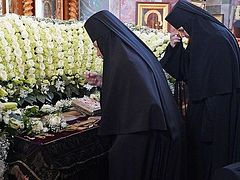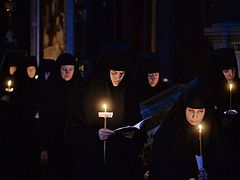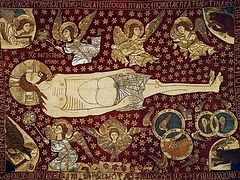Homily 1: Either Lead a Virtuous Life or Crucify the Lord
The prophet, having once seen God upon a Throne, exalted with glory, and sensing his own impurity and frailty, exclaimed in horror: Woe is me!... Because I am a man of unclean lips… For mine eyes have seen the King, the Lord of hosts (Is. 6:5). What should we tell you now, brethren, beholding God not exalted with glory, but belittled with dishonor; not upon a throne, but in the grave? What should we call ourselves, contemplating the fact that these wounds and this tomb are the work of our hands? Oh, accursed are we who by our sins not only brought the Son of God down to Earth, but also raised Him up upon the Cross and imprisoned Him in the tomb! Ah, had sin not erected a terrible partition between Heaven and Earth, and if we, like the Prophet, had seen God exalted in glory, the Son of God would have appeared in the world of men as He appears in the world of the angels. He would have visited Earth as the master of the house and a friend. With what joy would the unscathed sons of the innocent forefathers have met and accompanied Him! And now!... Oh, who will give water to my head, and mine eyes a fountain of tears (Jer. 9:1)? Let us weep day and night over this image. Let us weep that not only did we ourselves fall into the dust from the heights of immortality, but that we also brought the Son of God down into the grave!
Such is the power of sin, brethren! It seems like but a momentary neglect of duty, but it rages for an entire eternity; it’s committed at a certain, specific point on Earth, but it shakes all of Heaven; it seems to harm but one person; but the Son of God Himself must suffer to blot it out! Wretched forefather, would you have stretched forth your hand to the forbidden fruit had you seen that which now lies before our eyes? Would you have desired to become like God had you known that this desire would force God to die upon the Cross?
But the past is irrevocable! Man has only the present. And therefore, what is impossible for our forefather is absolutely possible for us, his descendants: We can save our Lord from new sufferings. In fact, brethren, the fruits of the forbidden tree do not grow in Eden alone, but everywhere. The tempting serpents haven’t ceased whispering in everyone’s ear: Ye shall not surely die… Ye shall be as gods (Gen. 3:4-5). Transgressing the law of God, we repeat the crime of our forefather; and repeating it, we make our Savior suffer again. Before every iniquity we commit, He stands before the court of our conscience as He once stood in the court of Pilate, and awaits the verdict from us: It’s in our will to release Him or crucify Him. In remaining firm in righteousness, loyal to truth, we set Jesus free; but in surrendering ourselves to sin and immersing ourselves in iniquity, we condemn Him to the Cross!
We crucify our Savior! And not out of ignorance, as did Judas, considering Him the son of Tecton,1 but perfectly aware that He is the Only-Begotten Son of God! Who doesn’t shudder at the very thought of it? Who wouldn’t hasten rather to give his hand to be cut off than agree to raise it against his Lord and Judge? Well, brethren! But what is the use of these ardent feelings of zeal when our deeds reveal the opposite?
In fact, don’t we sin continually? What—do we really sin to please our Savior? Are our sins a healing balm for these wounds? I repeat: It’s within our will to believe or not, but it is an unquestionable truth that when we give ourselves over to iniquity, we thereby betray our Lord to death. This is not my word, not the guesswork of the human mind, but the direct and strong admonition of the Apostle who says that people who have tasted of the Heavenly gift, and were made partakers of the Holy Spirit (and what Christian wasn’t a partaker of the Holy Spirit, at least in the Sacrament of Baptism?), that is, all of us Christians, and have fallen away from the holy and pure life into the abyss of wickedness and debauchery, crucify the Lord afresh (Heb. 6:4-6). With this testimony, all doubt must be silenced. After this, there is no middle ground: You must either lead a virtuous life or be numbered among the crucifiers of Jesus: He that is not with Me is against Me (Lk. 11:23), He Himself says.
Who among us is not for Thee, O Lord? Who can stand before this tomb and kiss these wounds and say, “I didn’t give you the kiss of Judas?”—Alas, They are all gone aside, they are all together become filthy: there is none that doeth good, no, not one (Ps. 13:3).
After this, how and to what degree does our present worship and magnification differ from those shaking heads, from those greetings: Hail, King of the Jews! (Mt. 27:29), with which the Divine Sufferer was greeted in Pilate’s praetorium?
Sinners’ worship of their crucified Savior can only have one supportable meaning, one sense: when they are united with the firm desire to no longer follow the path of lawlessness, to love the purity of conscience and to correct their lives. Then the sinner at the tomb of the Lord is like the Wise Thief who entered into Paradise directly from the Cross by repentance. And, brethren, it is such worshipers that our Lord now seeks among the sinners. “If ye indeed speak righteousness (Ps. 57:1), He now tells us through the prophet—if your words and magnification of Me are indeed not just idle sounds, if you truly want to show your love for Me, then judge uprightly, O ye sons of men (Ps. 57:1); ‘Put away the evil from your souls. Learn to do well’ (Is. 1:16-17). Fear not to appear at this grave with such feelings, although it was made with your own hands; fear not to kiss these wounds, although they were caused by your sins: Boldly cast the burden of all your sins at the foot of My Cross. But, having cast them down, return not to this burden. The Cross of our Savior (if you no longer have the desire to lighten it) will not collapse under any weight, but you may be overwhelmed by it and be cast into the abyss before you have time to turn to Me again and draw near to My Cross. Despite the glory that I now enjoy, I continue to appear to you in the form of my former condescension, that even the most foolish of you might know what your sins cost Me, and where they are leading you. Come to your senses and repent! Otherwise, your every obeisance before My Cross will become a new testimony against you.”
Can we, brethren, say anything better than the prayer of the thief: Remember me when Thou comest in Thy Kingdom (Lk. 23:42)? But if we pray with the lips of the Wise Thief, we will also have his heart. He’s not coming down from the cross to continue his path of iniquity; and let us not depart from this tomb to return to our former path of unrighteousness. Let us return by another path—the path of faith and piety, purity and truth, humility and meekness. It is best to begin the burial of your old man at the tomb of the Lord.
Amen.
Homily 3: Who Dares Pontificate When Christ Remains Silent?
One pious hermit had something to say to the brethren who were awaiting instructions from him. Imbued with a deep sense of human poverty, instead of any instruction, the elder (St. Macarius the Great, of Egypt) exclaimed: “Brethren, let us weep!” and all fell upon the ground and shed tears.
I know, brethren, that you also await now a word of edification, but my lips involuntarily close at the sight of the Lord resting in the grave. Who dares pontificate when He remains silent? And what can we tell you about God and His righteousness, about man and his unrighteousness, that these wounds couldn’t say a hundred times stronger? If any are not moved by them, will they be moved by the weak word of man? There was no preaching on Golgotha: There they only wept and smote their breasts (Lk. 23:48). And before this tomb is not the place for pontificating, but for repentance and tears.
Brethren! Our Lord and Savior is in the grave: Let us begin to pray and weep.
Amen.
Homily 5: Dare We Add to the Covenant of God?
When children gather at the tomb of their father, or subjects at the tomb of their lord, after their tears and lamentations, the first thing is to find out about the last will of the reposed. In these past days, brethren, we have also lamented, we have sighed and prayed, recalling the sufferings and death of our Lord. Now is the time, standing around His tomb, to learn of His last will for us. It cannot be that He would depart from us to the Father without leaving us some kind of testament. But lo, the book of the covenant is upon His breast!2 Let us dare, brethren, to open this sacred book that we may see and hear what the Lord says concerning us.
O brethren, He will speak peace unto His people (Ps. 84:9).
Peace I leave with you, My peace I give unto you: not as the world giveth, give I unto you (Jn. 14:27), And I appoint unto you a Kingdom, as My Father hath appointed unto Me (Lk. 22:29).
My God, is this testament for us? Lord, are we to sit upon the throne upon which You sit? But Thine is the Kingdom, Thine is the will! Without You, we are all nothing, but with You, we are everything! It was not in vain that You ascended the Cross: After this miracle, there are no miracles—everything is natural. It pleases You that wherever You are, there would be Your servant (Jn. 12:26). It’s not for servants to contradict this holy will. We are ready, O Lord, ready to share the glory of Your Kingdom with You. But what can we say? What do we need in order to accept this Kingdom? You Yourself didn’t suddenly ascend upon the throne. It cannot be that we are permitted to ascend it suddenly.
Whosoever will come after Me, let him deny himself, and take up his cross, and follow Me (Mk. 8:34). And he that taketh not his cross, and followeth after Me, is not worthy of Me (Mt. 10:38).
It’s not a light scepter for the Kingdom, but a scepter! Not a golden crown of thorns, but a crown! He Who speaks from the grave can demand life. He Who laid down His life for us (Jn. 10:15-17) will not give us stones instead of bread (Mt. 7:9). We are ready, O Lord, we are ready to receive the cross from Your hands. But what should we do when we collapse under this cross? You Yourself know that the spirit truly is willing, but the flesh is weak (Mk. 14:38). You Yourself called out for help when you were abandoned to the Cross by the Father. Where are we to turn when we are exhausted under the weight of the cross on the path to the Kingdom You bequeathed to us?
Let not your heart be troubled: ye believe in God, believe also in Me (Jn. 14:1).
Without Me ye can do nothing (Jn. 15:5). But if ye abide in Me, and My words abide in you, ye shall ask what ye will, and it shall be done unto you (Jn. 15:7).
Verily, verily, I say unto you, He that believeth on Me, the works that I do shall he do also; and greater works than these shall he do; because I go unto my Father (Jn. 14:12).
Verily, verily, I say unto you, Whatsoever ye shall ask the Father in My name, He will give it you. Hitherto have ye asked nothing in My name: ask, and ye shall receive… (Jn. 16:23-24); And whatsoever ye shall ask in My name, that will I do, that the Father may be glorified in the Son (Jn. 14:13).
These things I have spoken unto you, that in Me ye might have peace. In the world ye shall have tribulation: but be of good cheer; I have overcome the world (Jn. 16:33).
After such a promise, brethren, there is no room for fear and doubt. The covenant is true—sealed with blood, witnessed by Heaven and Earth, accepted and confirmed by the Father! And after such a covenant, there is no place to pontificate. If we don’t add our own words to the covenants of men, dare we add to the covenant of God? Everyone who has ears to hear has heard the last will of His Lord. If you want the Kingdom, take up the cross; if you have given out under the weight of the cross, turn to the Father; if the Father is slow to hear, the Son will appear, and help. Be thou faithful unto death (Rev. 2:10), and no matter who you are, you will sit upon the throne (Rev. 3:21) that was bequeathed unto you. Heaven and Earth shall pass away, but the words of He Who reposed shall not pass away (cf. Mt. 25:35).
It remains to entrust someone with the safekeeping of the priceless covenant. But who can be the guarantor between Heaven and Earth? Thou art the one mediator between God and men (1 Tim. 2:5). We have received this covenant from Thee, and we dare hand it over to Thee for safekeeping. Thou hast bequeathed it—do Thou fulfill it!




